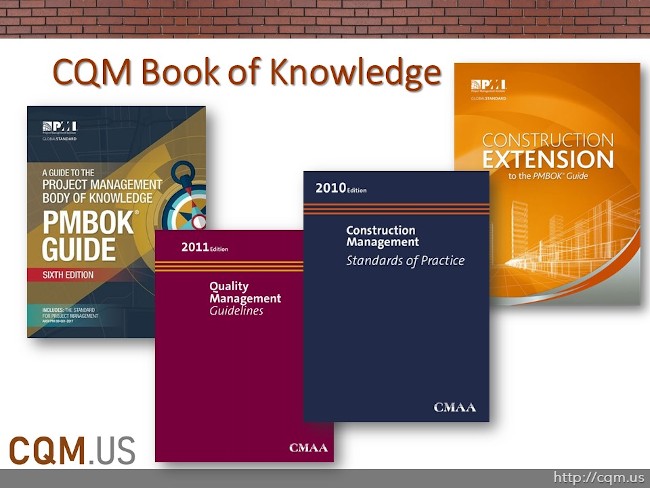For a better understanding of the CQM Methodology and its implementation, it is necessary for all the Construction Project Management Team to understand the terminology, processes, inputs, and outputs needed to communicate the Quality Management related tasks with the rest of the Project Management activities. CQM Book of Knowledge will help gather all that information in a structured format for reference and training purposes. In a sense, the CQM BoK could be similar to PMBoK’s Construction Extension, where a Quality Manager’s role and responsibilities are defined and explained per each knowledge area of the PMBoK and add few more chapters for the specific needs and requirements of the Quality Management Industry.
Construction Project Management Professional
The assumption of the CQM Methodology is that the Construction Project is being managed by Project Management Professionals specialized in Construction or as CQM calls them CPMP, Construction Project Management Professionals. PMI has not established a certification based on the Construction Extension, however, a PMP with an understanding of the Construction Extension will qualify as a CPMP as part of the CQM Methodology. In addition, other associations such as CMAA are trying to develop a Construction Project Management Book of Knowledge and Certification program that would have a better understanding and performance within the CQM Methodology than Construction Managers that have not gone through a similar training and certification program.

CQM Knowledge Areas
The CQM BoK is under development but will include the PMBoK Ten Knowledge Areas, in addition to Construction Extension’s specific Knowledge Areas as well as few recommended by CQM as follows:
- Project Integration Management
- Project Scope Management
- Project Time Management
- Project Cost Management
- Project Quality Management
- Project Resource Management
- Project Communications Management
- Project Risk Management
- Project Procurement Management
- Project Safety Management
- Project Environmental & Sustainability Management
- Project Financial & Claim Management
- Project LEAN Construction Management
- Project PMIS and Knowledge Management
- Project BIM Coordination Management
The CQM Manager’s role for each of these Knowledge Areas is somewhat explained in this CQM Implementation Handbook, however, there is a need for a CQM Book of Knowledge that would go through each of these Knowledge Areas and clearly define the roles and responsibilities of the Construction Project Manager’s role and the CQM Managers responsibilities.
CQM Inputs and Outputs
As mentioned the PMBoK is used as a benchmark for CQM Methodology, so similar to the PMBoK Framework, every document generated from the Apply CQM process will generate a document as a defined Output. These Outputs will become the inputs in other processes after certain tools and techniques is applied and new outputs are generated by the process. The difference between CQM Implementation and PMBoK is that the CQM is both Methodology and Framework, meaning that there will be a suggestion for what Tools and Techniques to be used, why, when, how, and by whom. Therefore, as the CQM Implementation Handbook is being developed and the CQM Community forms to create and agree upon a CQM BoK, there will be new innovative solutions and better practices available that must be considered in the Handbook and CQM BoK as live documents.